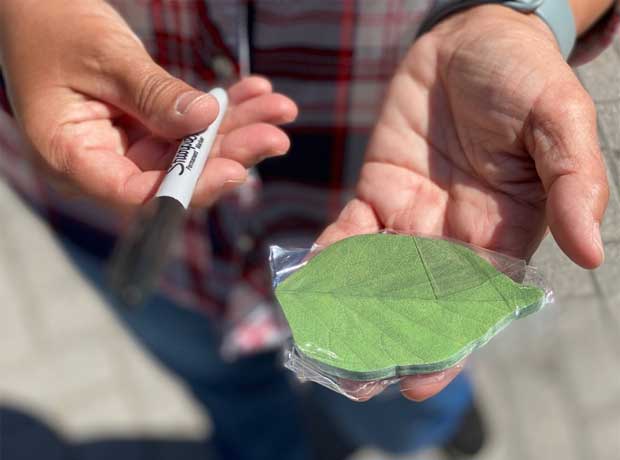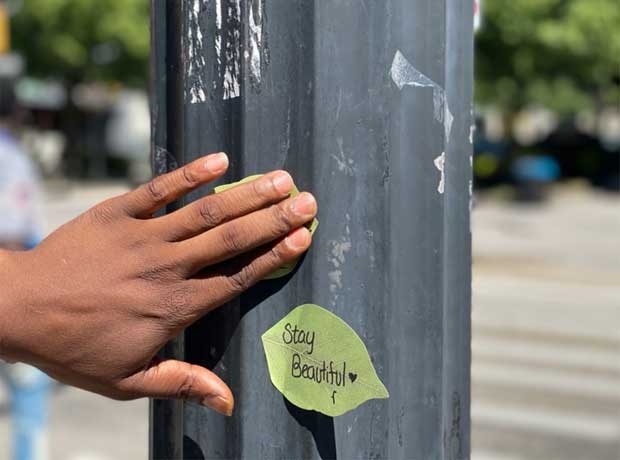
“Identify someone different from you; then the two of you go serve someone else. The best way to have reconciliation is through service. Not through racial seminars,” said Dr. Tony Evans, a famous black pastor, in a radio interview after the unjust and brutal killing of George Floyd. Dr. Evans’ quote stood out to me, because it points to the type of movement needed for our nation to heal.
While listening to the radio and lamenting the loss of George Floyd’s precious life, I wondered how I could be part of the solution, to help bring about meaningful change. The Healing Leaves Project came to mind. For this project, we pasted leaf-shaped Post-it notes with hand-written messages—words like “love wins” or “show empathy”—around the protest zone in Grand Rapids, Michigan, and prayed for healing.
On Sunday afternoons for the month of June, my Healing in Arts team and random individuals we have met on the sidewalk have been sticking these notes, which speak hope into our pain, on store windows, street benches, and lamp posts. We even gave a pack of leaf-shaped notes and a Sharpie to a stranger who wanted to participate.

In thinking about what more I could do to be part of the healing process, I remembered a situation from several years ago, where I learned some lessons on how to solve conflict through helping my neighbor and living by the Golden Rule—treat others the way you want to be treated. Here’s my personal story:
We have lived in several states because of my husband’s work. In one place, we had African-American neighbors move in next door. We appreciated these new neighbors, a young mother, whom I’ll call Monica, and her children, because our children would have new friends in the neighborhood.
From the very first day they moved in, the kids got together after school to play basketball or baseball in our yard. At times when the kids played, small conflicts occurred. For the most part, these skirmishes were easily solved between the children. But sometimes, Monica and I had to get involved to help solve the disagreements and restore the peace.
It’s fair to say that Monica and I both made some mistakes over the years as neighbors. Some of these mistakes caused friction. Overall, though, things flowed smoothly.
But one day, when I brought over some food as a gift, Monica got really offended. She explained that this particular gift insinuated that she had less than me. Because of my gift, she established a new boundary line between our homes; a line she didn’t want crossed—“ever again.” I felt surprised and disheartened at Monica’s strong response. After sincerely apologizing, I prayed for a chance to reconcile with her and make things right.
A few months later, an opportunity came to help Monica in a natural way. One day, as she was struggling to back up her car around another car parked in her driveway, I took a risk and went over to help her. It took about forty-five minutes to help direct her, but when Monica finally maneuvered around the other car safely, she got out of her car and ran over to give me a hug. In that moment, the tension that had existed between our two homes over the previous couple of months disappeared, and peace was finally restored.

Monica taught me how to be sensitive to others—what may be a gift to one person isn’t necessarily a gift to another. She also showed me the importance of humbly listening to others and respecting their boundaries so balance and harmony can exist. The Golden Rule and a willingness to change, on my part, helped reestablish peace between our two homes, and our kids continued to enjoy their backyard sports.
Years later, I discovered that within a five-house radius of our home, different neighbors showed love to Monica and her children through unique acts of service. One neighbor drove one of Monica’s sons to football practice. Another neighbor went to watch another of her sons play basketball. And a third neighbor invited the boys to the lake and taught them how to swim. There was no organized effort in the neighborhood to help Monica raise her children, yet several neighbors did their part to seek the common good for all.






